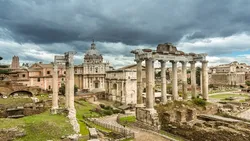
CLEP Western Civilization II: Study Guide & Test Prep 
Explore the essentials of CLEP Western Civilization II: Study Guide & Test Prep ▼
ADVERTISEMENT
Course Feature
![]() Cost:
Cost:
Paid
![]() Provider:
Provider:
Study.com
![]() Certificate:
Certificate:
Paid Certification
![]() Language:
Language:
English
![]() Start Date:
Start Date:
On-Demand
Course Overview
❗The content presented here is sourced directly from Study.com platform. For comprehensive course details, including enrollment information, simply click on the 'Go to class' link on our website.
Updated in [May 19th, 2023]
This CLEP Western Civilization II: Study Guide & Test Prep course is designed to help students prepare for the CLEP Western Civilization II exam. The course covers a variety of topics related to Western civilization, including the Renaissance, the Reformation, the Enlightenment, and the French Revolution. Each lesson includes a short video and self-assessment quizzes to help students master the material and practice answering the types of questions they'll find on the CLEP exam. The course also includes a comprehensive practice test to help students assess their readiness for the exam.
[Applications]
After completing this course, students can apply their knowledge of Western Civilization II by exploring the history of the region in greater depth. They can also use the information they have learned to better understand current events and the impact of the past on the present. Additionally, students can use the skills they have acquired to analyze primary source documents and to develop their own research projects.
[Career Paths]
1. Historian: Historians research, analyze, interpret, and write about the past. They use a variety of sources to gain an understanding of historical events and people. Historians often specialize in a particular time period or region, such as the Middle Ages or the American West. With the increasing availability of digital archives, historians are able to access more information than ever before, allowing them to develop more comprehensive and accurate interpretations of the past.
2. Museum Curator: Museum curators are responsible for the care and display of artifacts and other items in a museum. They research and acquire artifacts, develop and implement exhibitions, and provide educational programs to the public. As museums become more interactive and technology-driven, curators must stay up-to-date on the latest trends in order to create engaging experiences for visitors.
3. Archaeologist: Archaeologists study the material remains of past cultures in order to gain an understanding of how people lived in the past. They use a variety of methods, such as excavation, survey, and laboratory analysis, to uncover and interpret artifacts and other evidence. As technology advances, archaeologists are able to use more sophisticated methods to uncover and analyze artifacts, allowing them to gain a more comprehensive understanding of the past.
4. Education Administrator: Education administrators are responsible for managing the day-to-day operations of educational institutions. They develop and implement policies, manage budgets, and oversee the hiring and training of staff. As educational institutions become more complex, education administrators must stay up-to-date on the latest trends in order to ensure that their institutions are providing the best possible educational experience for their students.
[Education Paths]
1. Bachelor of Arts in History: A Bachelor of Arts in History is a great way to gain a comprehensive understanding of the development of Western civilization. This degree program typically covers topics such as the history of the Middle Ages, the Renaissance, the Enlightenment, and the Industrial Revolution. Students will also learn about the major political, social, and economic events that shaped the Western world. This degree is becoming increasingly popular as it provides a strong foundation for further study in fields such as law, politics, and international relations.
2. Master of Arts in European Studies: A Master of Arts in European Studies is a great way to gain a deeper understanding of the history and culture of the European continent. This degree program typically covers topics such as the history of the European Union, the development of the European Union, and the impact of European culture on the world. Students will also learn about the major political, social, and economic events that shaped the European continent. This degree is becoming increasingly popular as it provides a strong foundation for further study in fields such as international relations, public policy, and business.
3. Doctor of Philosophy in History: A Doctor of Philosophy in History is a great way to gain a comprehensive understanding of the development of Western civilization. This degree program typically covers topics such as the history of the Middle Ages, the Renaissance, the Enlightenment, and the Industrial Revolution. Students will also learn about the major political, social, and economic events that shaped the Western world. This degree is becoming increasingly popular as it provides a strong foundation for further study in fields such as law, politics, and international relations.
4. Master of Arts in International Relations: A Master of Arts in International Relations is a great way to gain a comprehensive understanding of the development of the global political system. This degree program typically covers topics such as the history of international relations, the development of international organizations, and the impact of international relations on the world. Students will also learn about the major political, social, and economic events that shaped the global political system. This degree is becoming increasingly popular as it provides a strong foundation for further study in fields such as international law, public policy, and business.
Course Provider

Provider Study.com's Stats at AZClass
Discussion and Reviews
0.0 (Based on 0 reviews)
Explore Similar Online Courses

Learn the basics of Grunfeld Defence - GM Markus Ragger (Elo: 2656)

10 Ways to Use ChatGPT AI with GTM

Python for Informatics: Exploring Information

Social Network Analysis

Introduction to Systematic Review and Meta-Analysis

The Analytics Edge

DCO042 - Python For Informatics

Causal Diagrams: Draw Your Assumptions Before Your Conclusions

Whole genome sequencing of bacterial genomes - tools and applications
Macroeconomics CLEP Prep

CLEP Introductory Business Law: Study Guide & Test Prep


Start your review of CLEP Western Civilization II: Study Guide & Test Prep